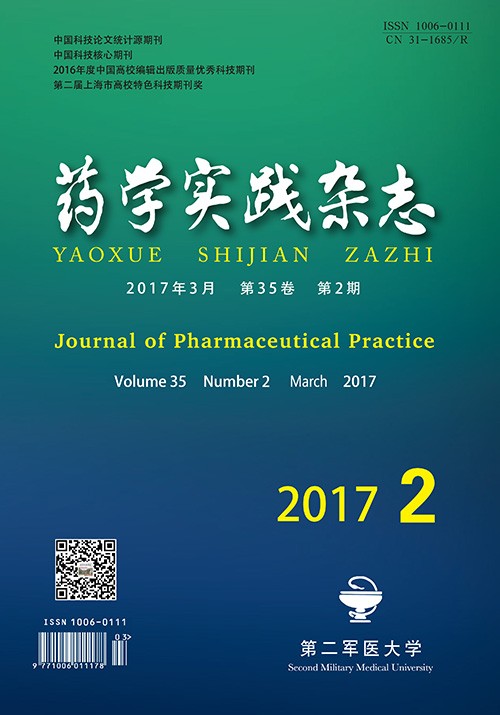QI Jing. The secondary prevention of aprepitant in moderate-severe vomiting caused by AC chemotherapy on breast cancer[J]. Journal of Pharmaceutical Practice and Service, 2017, 35(2): 158-160,181. doi: 10.3969/j.issn.1006-0111.2017.02.015
| Citation:
|
QI Jing. The secondary prevention of aprepitant in moderate-severe vomiting caused by AC chemotherapy on breast cancer[J]. Journal of Pharmaceutical Practice and Service, 2017, 35(2): 158-160,181. doi: 10.3969/j.issn.1006-0111.2017.02.015
|
The secondary prevention of aprepitant in moderate-severe vomiting caused by AC chemotherapy on breast cancer
-
Binzhou Medical University, Yantai 264003, China;Oncology Department, Dezhou Municipal Hospital, Dezhou 253000, China
- Received Date: 2016-12-01
- Rev Recd Date:
2017-03-01
-
Abstract
Objective To evaluate the efficacy and side effects of combination therapy with aprepitant, tropisetron and dexamethasone in the prevention of nausea and vomiting induced by AC chemotherapy in patients after breast cancer surgery. Methods 72 breast cancer patients were selected for this study. Those patients were admitted to the Oncology Department in Dezhou Municipal Hospital from January 2015 to May 2016. The patients were randomly divided into observation group (35 cases) and control group (37 cases). All patients underwent breast cancer surgery and followed by AC program for the first time chemotherapy. Chemotherapy induced nausea and vomiting (CINV) were rated moderate to severe during the course of chemotherapy. The patients in the observation group were treated with aprepitant, tropisetron hydrochloride and dexamethasone to prevent CINV. The control group was treated with tropisetron hydrochloride and dexamethasone. The efficacy and adverse reactions in acute phase (0~24 h) and delay phase (24~120 h) were recorded. Results There was no significant difference in the complete control rate (CR) between the two groups during acute phase (P>0.05). The observation group had significantly higher effective control rate (CR+PR) in acute phase compared to the control group (P<0.05). Both CR and CR+PR were statistically higher in observation group during delay phase (P<0.05). The main adverse reactions in two groups were constipation, fatigue, facial flushing, anxiety and dizziness. Those side effects are considered as mild and tolerable. Conclusion Triple antiemetic therapy including aprepitant has good efficacy and reasonable cost to effect ratio for patients received AC chemotherapy after breast cancer surgery with moderate-severe vomiting. This treatment is easy to accept for those patients.
-
References
|
[1]
|
Grunberg SM, Deuson RR, Mavros P, et al. Incidence of chemotherapy-induced nausea and emesis after modern antiemetics[J]. Cancer, 2004, 100(10):2261-2268. |
|
[2]
|
余华琴,陈华英,任若梅,等. 阿瑞匹坦三联止吐方案用于接受高致吐方案化疗患者的疗效观察[J]. 现代中西医结合杂志,2016,25(3):274-276. |
|
[3]
|
田奕,王平,马丽君.应用R-INVR国际量表评估阿瑞匹坦、欧赛、地塞米松对于乳腺癌患者化疗所致中重度呕吐治疗效果观察[J]. 中国现代医学杂志,2016,26(18):136-139. |
|
[4]
|
Hesketh PJ. Comparative review of 5-HT3 receptor antagonists in the treatment of acute chemotherapy-induced nausea and vomiting[J]. Cancer Invest, 2000, 18(2):163-173. |
|
[5]
|
于莉,张晓晔.阿瑞匹坦在实体肿瘤化疗止吐治疗的研究进展[J]. 中国肿瘤临床与康复,2016,23(9):1148-1152. |
|
[6]
|
Aapro M, Carides A, Rapoport BL, et al. Aprepitant and fosaprepitant:a 10-year review of efficacy and safety[J]. Oncnlogist, 2015, 20(4):450-458. |
|
[7]
|
郑琪,廖子君,李旭,等. 阿瑞匹坦治疗化疗诱导的爆发性恶心呕吐的临床观察[J]. 山西医科大学学报,2016,47(6):539-543. |
|
[8]
|
Chu CC, Hsing CH, Shieh JP, et al. The cellular mechanisms of the antiemetic action of dexamethasone and related glucocorticoids against vomiting[J]. Eur J Pharmacol, 2014, 722:48-54. |
|
[9]
|
丁荣楣,王平,田奕,等. 阿瑞匹坦辅助预防乳腺癌FAC方案化疗致恶心呕吐的临床观察[J]. 疑难病杂志,2015,14(1):45-48. |
-
-
Proportional views

-







 DownLoad:
DownLoad: